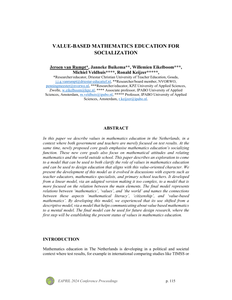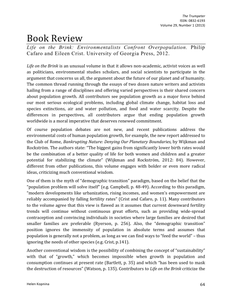This article explores how concern about animal welfare and animal rights relates to ecological citizenship by discussing student assignments written about the Dutch Party for Animals or PvdD. ‘Animal welfare’, ‘animal rights’, and ‘ecological citizenship’ perspectives offer insights into strategic choices of eco-representatives and animal rights/welfare advocates as well as educators. The assignments balance animal issues with socio-economic ones, explore the relationship between sustainability and ethics, and attribute responsibility for unsustainable or unethical practices. Analysis of student assignments reveals nuanced positions on the anthropocentrism-ecocentrism continuum, showing students’ ability to critically rethink their place within larger environmental systems. Some students demonstrated compassion for nonhumans, indicating that biophilia is evenly distributed among different groups of students. This article finds that fostering pro-environmentalism and animal welfare or rights requires the deepening of the debate contesting but also connecting key issues in sustainability and ethics. This analysis can be valuable for political parties representing nonhumans, or for education practitioners in getting students to think about the challenges in human-environment relationships and for advancing support for ecodemocracy. https://ro.uow.edu.au/asj/vol8/iss1/10/ LinkedIn: https://www.linkedin.com/in/helenkopnina/
MULTIFILE

This article aims to gauge students’ perceptions of the Dutch Party for Animals (PvdD) in order to reflect on the political representation of nonhumans (animals). The support for political representation of nonhumans is based on the ethical underpinning of deep ecology; growing recognition of the importance of sustainability; and increased societal support for animal rights and welfare. This article reflects on these developments using Bachelor students’ assignments from a Sustainable Business course, which asked them to reflect on the underlying principles of the PvdD. Student assignments indicate that educational efforts targeted at fostering ecological citizenship have a positive effect on the recognition and acceptance of ecocentric values. https://doi.org/10.1163/15685306-00001660 LinkedIn: https://www.linkedin.com/in/helenkopnina/
MULTIFILE

This article aims to gauge students’ perceptions of the Dutch Party for Animals (PvdD) in order to reflect on the political representation of nonhumans (animals). The support for political representation of nonhumans is based on the ethical underpinning of deep ecology; growing recognition of the importance of sustainability; and increased societal support for animal rights and welfare. This article reflects on these developments using Bachelor students’ assignments from a Sustainable Business course, which asked them to reflect on the underlying principles of the PvdD. Student assignments indicate that educational efforts targeted at fostering ecological citizenship have a positive effect on the recognition and acceptance of ecocentric values. https://doi.org/10.30560/sdr.v1n1p11 LinkedIn: https://www.linkedin.com/in/helenkopnina/
DOCUMENT

At present, leading international agencies, such as the United Nations Environmental Programme, are largely focused on what they claim to be ‘win-win’ scenarios of ‘sustainable development’ rhetoric. These combine social, economic and environmental objectives. However, as noted by the ‘Scientists’ Warning to Humanity’, environmental integrity is the essential precondition for the healthy functioning of social and economic systems, and thus environmental protection needs to be prioritized in policy and practice. Ecological sustainability cannot be reached without realizing that population growth and economic growth, with attendant increased rates of depletion of natural resources, pollution, and general environmental degradation, are the root causes of unsustainability. This article argues that to strategically address ecological unsustainability, the social, economic and political barriers to addressing the current economic model and population growth need to be overcome. Strategic solutions proposed to the current neoliberal economy are generic – namely, degrowth, a steady-state economy, and a ‘circular economy’. Solutions to demographic issues must be sensitive to the countries' cultural, social, political and economic factors to be effective as fertility differs from country to country, and culture to culture. As discussed here, Mediterranean countries have the lowest fertility in the world, while many countries in Africa, and some in Asia, South America have stable but consistently high birthrates. This is discussed using three case studies - Tanzania, Italy, and Cambodia, focusing on the "best case" policy practice that offers more realistic hope for successful sustainability. https://doi.org/10.1007/s41207-019-0139-4 LinkedIn: https://www.linkedin.com/in/helenkopnina/
MULTIFILE

This article presents and discusses student assignments reflecting on the documentary film If a Tree Falls, written as part of the Business Ethics and Sustainability course at The Hague University of Applied Sciences. This article follows two lines of inquiry. First, it challenges mainstream environmental education, supporting critical pedagogy and ecopedagogy. These pedagogies, which advocate pedagogy for radical change, offer a distinct and valuable contribution to sustainability education, enabling students to critically examine normative assumptions, and learn about ethical relativity, and citizenship engagement from environmentalists. The discussion of “lessons of radical environmentalism” is pertinent to the question of what types of actions are likely to achieve the widely acceptable long-term societal change. While this article focuses on student reflection on a film about radical environmentalism, this article also discusses many forms of activism and raises the question of what can be considered effective activism and active citizenship in the context of the philosophy of (environmental or sustainability) education in connection didactics and curriculum studies. Second, this article argues for the need for reformed democracy and inclusive pluralism that recognizes the needs of nonhuman species, ecocentrism, and deep ecology. The connection between these two purposes is expressed in the design of the student assignment: It is described as a case study, which employs critical pedagogy and ecopedagogy. https://doi.org/10.3390/educsci9040284 LinkedIn: https://www.linkedin.com/in/helenkopnina/
MULTIFILE

This article will discuss social, environmental, and ecological justice in education for sustainable development (ESD) and Education for Sustainable Development Goals (ESDG). The concept of sustainable development and, by extension, the ESD, places heavy emphasis on the economic and social aspects of sustainability. However, the ESD falls short of recognizing ecological justice, or recognition that nonhumans also have a right to exist and flourish. An intervention in the form of an undergraduate course titled Politics, Business, and Environment (PBE) will be discussed. As part of this course, students were asked to reflect on the three pillars of sustainable development: society, economy, and environment, linking these to the fourth concept, ecological justice or biospheric egalitarianism. Biospheric egalitarianism is characterized by the recognition of intrinsic value in the environment and is defined as concern about justice for the environment. Some of the resulting exam answers are analyzed, demonstrating students’ ability to recognize the moral and pragmatic limitations of the anthropocentric approach to justice. This analysis presents ways forward in thinking about the role of “ecological justice” as the ultimate bottom line upon which both society and economy are based. https://doi.org/10.3390/educsci10100261 LinkedIn: https://www.linkedin.com/in/helenkopnina/
MULTIFILE

Purpose The purpose of this paper is to synthesize the fragmented literature on organizational citizenship behavior (OCB), leader–member exchange (LMX), learning, innovative work behavior (IWB) and employee performance across different countries, disciplines and organizations, thereby broadening the literature breath and making gap identification comprehensive. Second, it provides information on how much studies have been concentrated on Africa with the goal of provoking scholarly work in a unique cultural setting on the interrelatedness of these concepts. Design/methodology/approach Relevant literature search was undertaken using key search terms, “employee performance,” “OCB,” “LMX,” “IWB,” “individual learning” and “team learning.” Findings The findings show positive relationships between the behaviors and employee performance. They also reveal an interesting diversity in the study across multidisciplinary fields holding both cultural and contextual significance for academia and practitioners. Research limitations/implications – The limitation of literature to peer-reviewed journals from the authors’ university library might have missed important information not in this domain. Further studies must make use of additional search terms and engines excluded from this study to provide a more comprehensive analysis. Practical implications The paper has important managerial implications for practitioners. The analysis can support the understanding of employee performance from a broader and more diverse view points; and help in providing insight into real-life opportunities, constraints and solutions in enhancing performance management. Originality/value – This systematic literature review highlights important knowledge gaps which need to be explored especially in the African and Ghanaian contexts.
DOCUMENT

In this paper we describe values in mathematics education in the Netherlands, in a context where both government and teachers are merely focused on test results. At the same time, newly proposed core goals emphasise mathematics education’s socializing function. These new core goals also focus on mathematical attitudes and relating mathematics and the world outside school. This paper describes an exploration to come to a model that can be used to both clarify the role of values in mathematics education and can be used to design education that aligns with this value-oriented character. We present the development of this model as it evolved in discussions with experts such as teacher educators, mathematics specialists, and primary school teachers. It developed from a linear model, via an adapted version making it too complex, to a model that is more focused on the relation between the main elements. The final model represents relations between ‘mathematics’, ‘values’, and ‘the world’ and names the connections between these aspects ‘mathematical literacy’, ‘citizenship’, and ‘value-based mathematics’. By developing this model, we experienced that its use shifted from a descriptive model, via a model that helps communicating about value based mathematics to a mental model. The final model can be used for future design research, where the first step will be establishing the present status of values in mathematics education.
DOCUMENT

Life on the Brink is an unusual volume in that it allows non-‐academic, activist voices as well as politicians, environmental studies scholars, and social scientists to participate in the argument that concerns us all, the argument about the future of our planet and of humanity. The common thread running through the essays of two dozen nature writers and activists hailing from a range of disciplines and offering varied perspectives is their shared concern about population growth. All contributors see population growth as a major force behind our most serious ecological problems, including global climate change, habitat loss and species extinctions, air and water pollution, and food and water scarcity. Despite the differences in perspectives, all contributors argue that ending population growth worldwide is a moral imperative that deserves renewed commitment. https://www.linkedin.com/in/helenkopnina/
DOCUMENT

Stefan Bengtsson's commentary about policy hegemony discusses the alternative discourses of socialism, nationalism, and globalism. However, Stefan does not adequately demonstrate how these discourses can overcome the Dominant Western Worldview (DWW), which is imbued with anthropocentrism. It will be argued here that most policy choices promoting sustainability, and education for it, are made within a predetermined system in which the already limiting notion of environmental protection is highly contingent on human welfare. What would really contest the dominant assumptions of Vietnamese policy and, more specifically, education for sustainable development (ESD) is an alternative discourse that challenges the DWW. That alternative discourse embraces philosophical ecocentrism and practices of ecological justice between all species, and deep ecology theory - all perspectives fundamentally committed to environmental protection. https://doi.org/10.1080/00958964.2015.1048502 LinkedIn: https://www.linkedin.com/in/helenkopnina/
MULTIFILE
